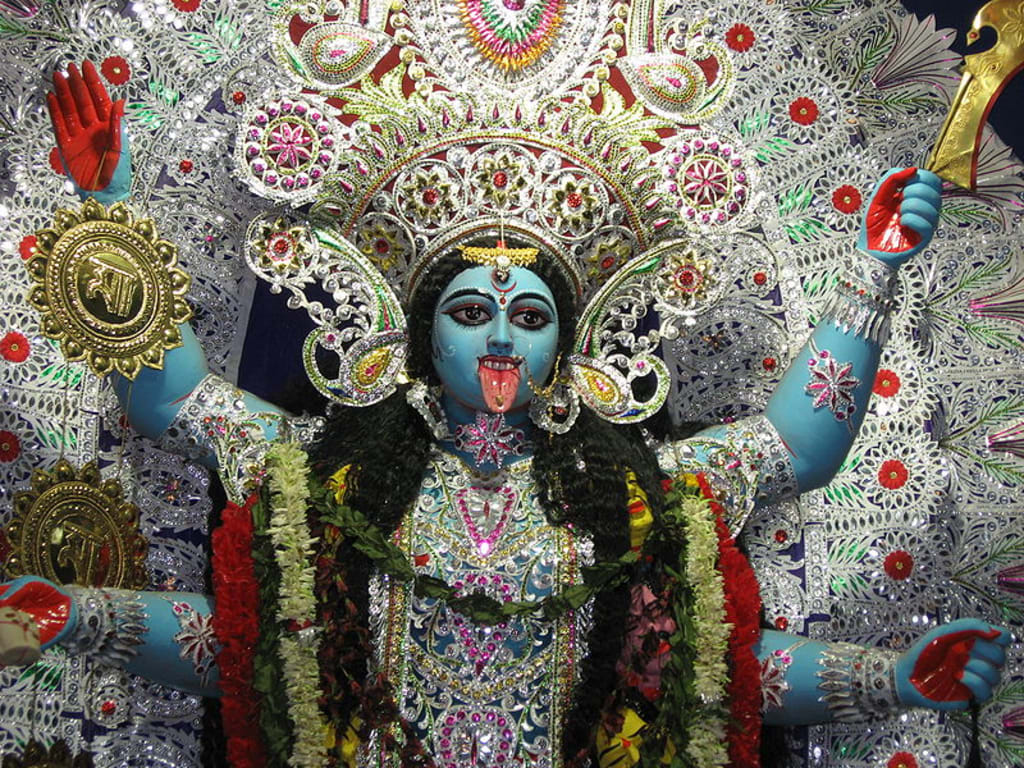Worshiping Wrath
Analysis of “A Father” by Bharati Mukherjee

God, religion, faith, tradition, these are some things that everyone is brought up with. They are that aspect of a person’s heritage that defines their beliefs and actions. It is perfectly normal and unquestionable if one adheres to a God of peace and good instruction, however, what if the God one worships is that of something less spiritual? In, “A Father” by Bharati Mukherjee there are two such things that Mr. Bhowmick institutes in his life which also serve as major themes in the story. These themes are wrath and dissatisfaction.
A short summary may be needed in order to fully understand these themes. In “A Father” Bharati Mukherjee breaks down Mr. Bhowmick, a very superstitions and well off man from India who moves to Detroit together with his wife and their baby daughter Babli, who later, is discovered to be pregnant out of wedlock. Mr. Bhowmick’s first reaction is to blame his free spirited wife who, as an agnostic and a lover of the American lifestyle, never followed his family’s beliefs or traditions and in fact was the reason that they moved to a, “sex crazy state like Detroit” (369). Knowing his daughter’s independent personality, he deduces that Babli will abort the baby, however, as he considers the idea that there is a man that loves his daughter and that he could be a grandfather he begins to become more and more excited about the pregnancy. On the day that his daughter’s state is revealed to his wife, Mr. Bhowmick tries to defend his daughter from the enraged, rolling-pin wielding woman, but when Babli reveals that the pregnancy is due to an artificial insemination he himself turns on her and strikes the unborn baby in her stomach with the rolling-pin. His wife calls the police.
Wrath was the first thing that I thought of the moment that Mr. Bhowmick attacked his unborn grandson. Wrath, that little statue in his bedroom that he so faithfully prayed to every day, more correctly named, “Kali,… the goddess of wrath and vengeance.” (364) Though the influence this patron goddess had on Mr. Bhowmick is most clear right in that fatal instant, evidence of her control over him is apparent throughout the story. Wrath is a generational concept that was handed down to Mr. Bhowmick from his family, his grandmother who taught him how to worship the “the patron goddess of his family,” (364) and by the example of his father. An instance of this can be seen in the very beginning of the story. A typical, maybe even laughable scene of the family’s morning routine is shown in which his wife nags him and he threatens to, “beat her with his shoe as his father had threatened his mother.” Another example of Kali’s control is shown in Mr. Bhowmick’s ideology. As Mr. Bhowmick gives an account of him and his wife’s marriage, he states that, “[He never loved her]…he felt guilty for having shunned her during those unhappy years. But he had thought of it then as revenge.” Revenge? Why would he need revenge on the wife whom he chose? That is because vengeance is Kali’s second virtue. Lastly, the goddess herself, that little black statue with the sultry pink tongue is the image that drives Mr. Bhowmick to strike Babli. He did not have to think about it because Wrath told him exactly what to do. When she defiantly grinned at her father and mother and proceeded to mock their marriage and their traditions, he showed her his wrath. ”Wrath - Vengeance or punishment as a consequence of anger.”(Dictionary.com)
Money and social status as a subsequence is the second most influential theme of this story. Words relating to money, extravagance and class appear at least twenty five times throughout; words like: Rolex, MasterCard, pension plans, good job, middle class, beggar boys and public shame. However, the Bhowmick family is never shown as a happy family, despite their wealth. The pursuit of personal desires acts as a catalyst for the family’s dysfunction. It begins with Mr. and Mrs. Bhowmick’s marriage. They did not marry for love or a family, rather, he married her because she was the daughter of a barrister and because her father had, “… sweetened the deal by throwing in an all-expenses-paid two years’ study at Carnegie Tech” (368) The perk backfires however, because in those two years his wife becomes, “a believer of ambition, not grace,” (364) and her constant nagging at his lack thereof drains him severely. His wife’s drive to attain her own wants outweighs the desire to care for her family without question. She disregards his family’s honor by hiring a lower class woman to cook for the family in accordance to her, “’American’ ideas.” When their daughter is born they are both already dissatisfied with their lives and in pursuit the pursuit of their own personal gain and their daughter consequently grows up to be the same. The only difference is that she grows up despising the idea of marriage, seeing the unhappiness that it brought her parents. She wants a baby but not marriage, never mind the fact that the baby would have probably grown up as miserable and dissatisfied as the rest of its family.
These things that the Bhowmick family spent so much of their time focused on, what they worshiped, are the things that motivated their decisions. Mr. Bhowmick worshiped wrath and made an impulsive violent decision as a result. The family each focused on their own aspirations rather than being content with each other and ultimately they were divided in the end. The things we worship become inbred and define who we are. One should choose carefully what one worships or he could end up in a bad situation like Mr. Bhowmick.
Works Cited
Mukherjee, Bharati. “A Father” in Liturature and the writing process, 9th ed. Elizabeth
McMahon, et. al., eds. Boston: Longman, 2011. 363-70
Dictionary.com. Definition of “Wrath”
About the Creator
Sara Cooney
I received my Associates Degree of Fine Arts from Central New Mexico Community College in 2014.
I lived in Japan for 6 years as an English teacher where I explored my creative voice and developed into the person I am now.






Comments
There are no comments for this story
Be the first to respond and start the conversation.